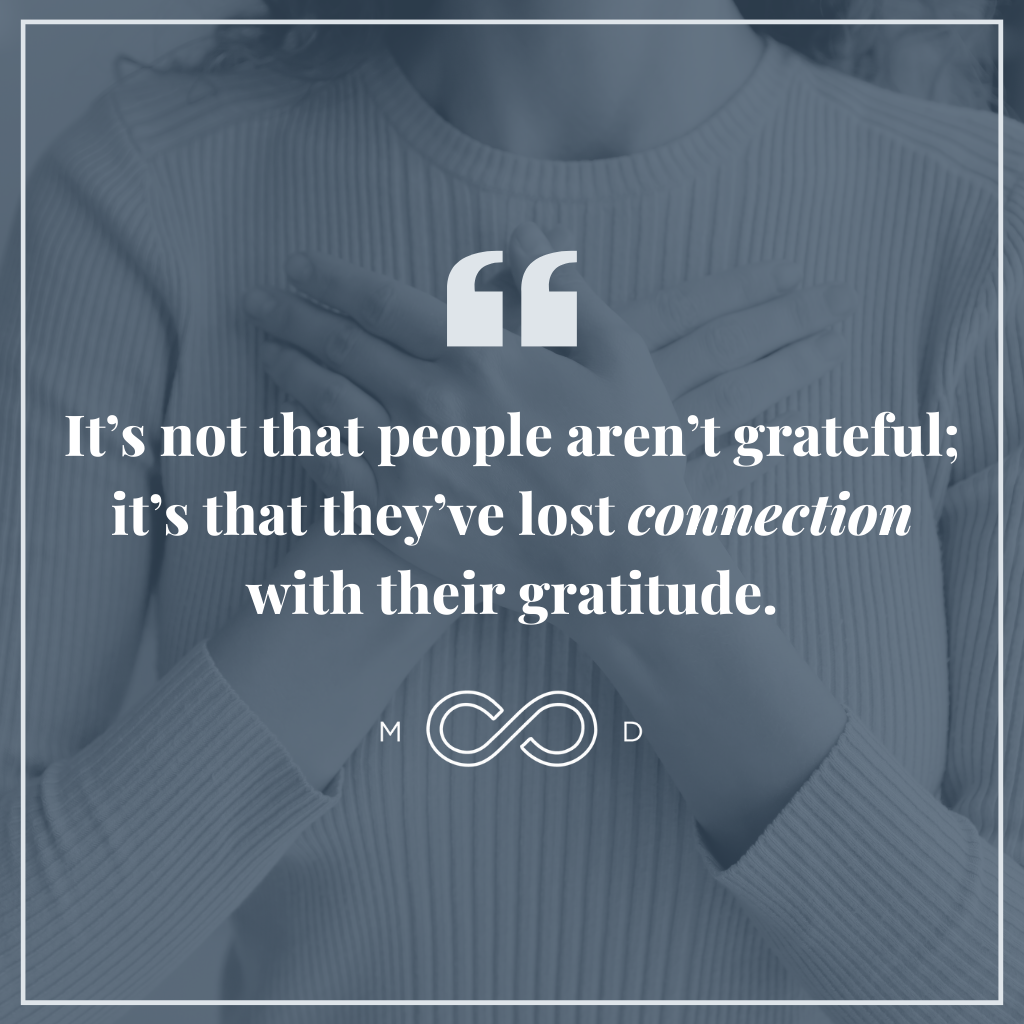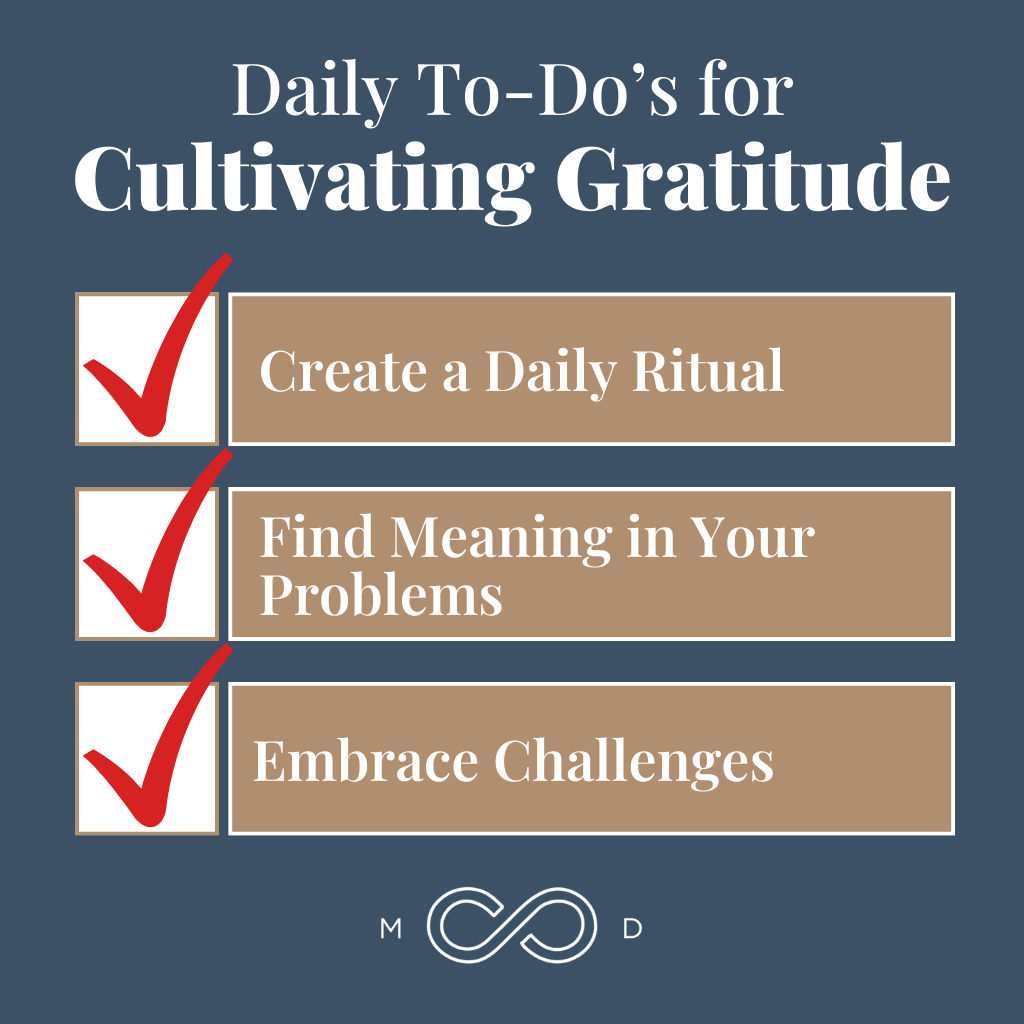Have you felt gratitude today?
I think most people would say yes. However, my observation in taking care of high-level individuals is that there’s often a disconnect between understanding the concept of gratitude and knowing the experience of being grateful.
Many of us give thanks on the fourth Thursday in November, or during weekly worship services. What I’m talking about is more all-encompassing. It’s being rooted in a grateful state — cultivating an attitude of gratitude where that feeling of appreciation becomes part of your posture toward everything.
For most of us, it’s easier said than done. Maybe you begin the day with a grateful heart but become distracted by the various challenges and frustrations that arise. Then, when those obstacles dissipate, it’s difficult to recapture your previous perspective.
I’ve found that cultivating gratitude affects a foundational shift in a person’s life, leading to greater joy and less anxiety. Let’s talk about how to get there.
Context and Perspective Are Everything
My experience has shown me it’s not that people aren’t grateful; it’s that they’ve lost connection with their gratitude.
Life throws punches every day. In the midst of that, we can easily forget how grateful we are and what we’re grateful for.
I work to unpack this with members at Brentwood MD. Sometimes, this simply means reminding them of the context of a situation they’re struggling with. Even with such a small reminder, many people recapture their experience of gratitude, either immediately or with a little practice. And the benefits aren’t only psychological.
In fact, experts have found that gratitude is good medicine. For example, it’s linked to fewer signs of heart disease!
Why? For one thing, anxiety drops when you reconnect with an appropriate level of gratitude. And cultivating a proper perspective on how the things that trouble you fit into the grand scheme of your life is very soothing. It’s a healthier state to be in over the long term.
Strengthen Your Gratitude Muscle
Gratitude requires exercise. Just as without physical exercise, your muscles grow weak with a lack of activity, your gratitude muscle can also atrophy. I call this Acute Gratitude Deficiency. One of the symptoms is an abiding and underlying anxiety that taints everything. Authentic joy becomes elusive. If you’re not anchored in a foundation of gratitude, it’s very difficult to fully experience joy, fulfillment, and serenity.
The best way to go from where you are to a more aware, healthy state of perpetual gratitude is to create a daily ritual. Then, you can practice strengthening your gratitude muscle, gradually approaching your life from a more grateful posture.
You might start with being thankful for some simple — but big — things: your breath, that you’ve lived another day, that the sun is shining. As you strengthen that muscle, you’ll be able to add new items you didn’t realize you were overlooking.
When your default becomes finding gratitude, you develop the sense that life is happening for you, not to you. It’s the difference between a sense of agency and one of helplessness.
Daily To-Do’s for Cultivating Gratitude
Create a Daily Ritual
Mornings are my time for gratitude. This time of day is quieter and easier to control. Before I boot up my laptop or check my phone, I focus on three to five things I’m grateful for. This might be my health, my family’s health, or my thriving medical practice. The goal is to remember how good the good in my life is.
When the good is good on the most important things, it has this amazing ability to quiet the things that aren’t good, or that aren’t all that important.
Your daily gratitude ritual might include:
- Reading
- Writing
- Reflecting
- Praying
- Meditating
For many people, morning is an opportune time to carve out a few minutes to start the day, remembering how lucky they are for various things and anchoring themselves in gratitude. Then, they can go out and tackle the things that aren’t wonderful from a totally different posture.
Find Meaning in Your Problems
It’s easy to feel grateful for the good things that happen to you. But what about the difficult things? I’ve begun to expand my gratitude to include high-quality problems.
What do I mean by that? Well, to be alive is to have problems. In fact, the name of the game isn’t eliminating problems, because the only person without problems is a dead person.
High-quality problems are problems I want in my life because they indicate that I’m doing meaningful work and that I’m growing and learning. In business, maybe this is a new lease that needs reviewing or a new team member who isn’t the right fit. You can recognize and honor that these are genuine challenges, but also discipline yourself to see the bigger picture: You only have these problems as a result of positive factors in your business.
By taking a slightly different vantage point, you assign a different emotional experience to these problems, one that feels more productive, less toxic, and easier to move through.

Embrace Challenges
As my life unfolds, I’m faced with newer and bigger problems. I’m always going to have problems, and I’m ever grateful for them. Learning how to appreciate these has helped me grow. It’s helped me in my relationships with my family, my business, and my members.
When you make an intentional practice of gratitude, your life feels richer. Be grateful for the good, but also for the bad. Do you need a break every now and again? Absolutely. But you can’t eliminate problems and challenges altogether.
To be alive is to have problems. To be grateful for them is a gift.

Dr. Aaron Wenzel is a concierge physician specializing in the care of fast-moving entrepreneurs, executives, and public figures in the Nashville, TN area. Dr. Wenzel’s diverse life experience and extensive training in family medicine, emergency care, nutrition, and hormone replacement therapies give him the unique platform to provide unmatched care for his patients.







